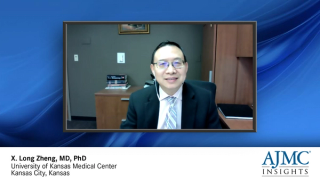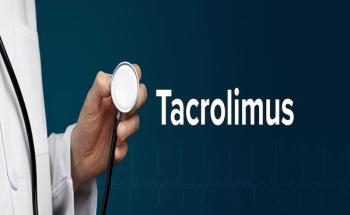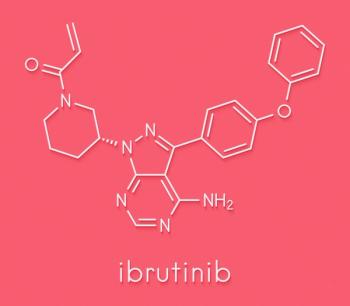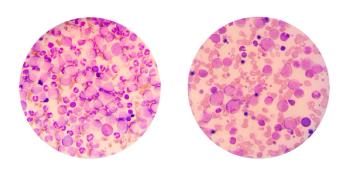
Hematology
Latest News

Latest Videos

CME Content
More News

The key secondary end point of overall survival (OS) was met in the DREAMM-7 trial of belantamab mafodotin (Blenrep; GSK) for the treatment of patients with relapsed/refractory multiple myeloma (R/R MM).

Don M. Benson, MD, PhD, has cared for patients at James Cancer Hospital in Ohio for 22 years, where he and his team see approximately 10,000 patient visits each year.

Findings of a recent study indicate that NUP98 rearrangements can significantly impact outcomes in patients with acute myeloid leukemia (AML).

Posttransplantation treatment with either tacrolimus or cyclosporine A results in favorable outcomes, but tacrolimus may be better at preventing severe graft-versus-host disease (GVHD), according to new study findings.

Physicians also differed from caregivers when asked how many hours of caregiving patients required each week.

Three proteins—THRAP3, STMN1, and GNA13—are overrepresented in blood cancers like acute myeloid leukemia (AML) and could prove to be novel targets for future therapies.

Although Bruton tyrosine kinase (BTK) inhibitor monotherapy in chronic lymphocytic leukemia (CLL) has been a game-changer, patients have significantly increased risks of infection, especially in the upper respiratory tract.

In part 2 of our interview with Surbhi Sidana, MD, MBBS, American Society of Hematology and Stanford University, she delves into one of the hottest topics in the hematologic malignancy space today: minimal residual disease (MRD) status.

A new study identifies potential immune profile differences in patients with chronic lymphocytic leukemia (CLL) that may lead to resistance after ibrutinib therapy.

The case study, which showed prolonged disease control achieved with gilteritinib in a previously-treated patient with AML with an inv(2)(p23q13) translocation, indicates that gilteritinib can also be used as an anaplastic lymphoma kinase (ALK) inhibitor.

A recent study evaluates the dosing, safety, and efficacy of telaglenastat and azacytidine to treat advanced myelodysplastic syndromes (MDS), with promising results.

Investigators say adding RNA interference (RNAi) therapy to current treatment modalities may improve outcomes in patients with acute myeloid leukemia (AML) with internal tandem duplication in the fms-like tyrosine kinase 3 (FLT3) gene.

A comparison of the second-generation Bruton tyrosine kinase (BTK) inhibitor acalabrutinib to the first-generation ibrutinib shows the former had lower rates of adverse events in a real-world setting.

Researchers investigate the expression of PARP1 in leukemias with BCR::ABL1 p190+ translocation, finding differential expression in ALL, AML, and CML but no significant correlation with clinical parameters.

On September 20, the FDA approved isatuximab plus bortezomib, lenalidomide, and dexamethasone in the first line for patients who have multiple myeloma and are ineligible for transplant.

Health plans would see savings faster if they switched to etranacogene dezaparvovec sooner, the investigators found.

New study provides insights into the relationship between TP53, miR-34a, and NOTCH1 in CLL cells.

Results from a retrospective study compared and explored biomarkers associated with outcomes in myelodysplastic syndrome (MDS) with plasma cell neoplasms.

A new study demonstrates that the combination of lenalidomide (Revlimid) and obinutuzumab (Gazyva) is effective and well-tolerated in treating relapsed indolent non-Hodgkin lymphoma (NHL).

Patients with sickle cell anemia (SCA) and persistent albuminuria (PA) exhibited significantly higher levels of urinary angiotensinogen (AGT).

Genetic variability and sex-specific differences may play a role in sickle cell disease (SCD)-related pain; however, more research is needed.

The researchers suggest certain refinements to the 2022 European LeukemiaNet classification model for patients aged 60 years or older receiving lower intensity treatment (LIT), including the adoption of a mutation score that accounts for certain gene mutations.

Using real-world data, researchers compared 2 chimeric antigen receptor (CAR) T-cell therapies with a bispecific antibody, teclistamab, in multiple myeloma (MM).

Celiac disease presents a higher risk for developing malignant neoplasms, including small intestine, lymphoma, and skin cancers, but presents a lower risk for respiratory malignancies.

A new report based on patient focus groups suggests many clinicians can do more to help patients with sickle cell disease (SCD) feel heard and understood.













